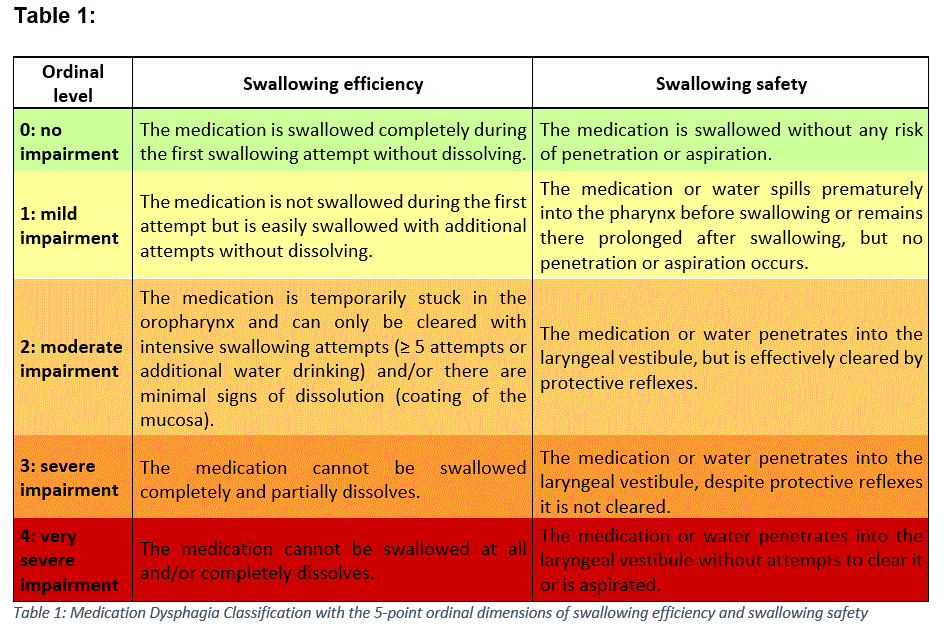Category: Rating Scales
Objective: This study attempted to obtain a comprehensive picture of medication intake dysphagia in Parkinson’s disease (PD). Specific investigations included 1) An objective, graduated and multidimensional classification of medication dysphagia in PD, 2) the association of medication dysphagia and motor complications, 3) the prevalence of medication dysphagia in relation to oral dosage form and normal bolus dysphagia and 4) predictors of medication dysphagia.
Background: Dysphagia is common in PD and assumed to complicate medication intake. However, there are few studies which have systematically assessed dysphagia during medication swallowing and its relation to motor complications.
Method: A classification of medication dysphagia was developed based on a retrospective analysis. In a prospective study, 66 PD patients then underwent flexible endoscopic evaluation of swallowing, which included swallowing of 4 dosage forms (small and large tablets [10-17mm length] and capsules [19 – 29mm length]).
Results: A two-dimensional, graduated, and reliable classification of medication dysphagia was introduced which differentiated between swallowing efficiency (impaired clearing, dissolution) and safety (risk of aspiration). Medication dysphagia predicted motor complications according to the MDS-UPDRS p-IV in a linear regression model. Swallowing efficiency, but not safety, differed by oral dosage form, with capsules tending to be swallowed more efficiently than tablets, irrespective of size. There was a moderate correlation between normal bolus dysphagia and medication dysphagia, although in individual cases, patients with severe medication dysphagia did not have normal bolus dysphagia. A score of ≥1 on the swallow-related MDS-UPDRS-items 2.3 and 2.4 can be considered as optimal cut-off for predicting medication dysphagia (sensitivity: 70.8%, specificity: 70.7%).
Conclusion: Medication dysphagia is present in nearly 70% of PD patients and possibly predisposes to motor complications. Capsules, irrespective of size, tend to be swallowed more efficiently than tablets. Medication dysphagia should be evaluated independently of normal bolus dysphagia. The swallow-related MDS-UPDRS items may be used as screening parameters for medication dysphagia with moderate sensitivity and specificity.
To cite this abstract in AMA style:
B. Labeit, E. Berkovich, I. Claus, M. Roderigo, AL. Schwake, D. Izgelov, D. Mimrod, S. Ahring, S. Oeleberg, P. Muhle, V. Zentsch, F. Wenninger, S. Suntrup-Krueger, R. Dziewas, T. Warnecke. Dysphagia and its relationship to medication intake in Parkinson’s disease [abstract]. Mov Disord. 2022; 37 (suppl 2). https://www.mdsabstracts.org/abstract/dysphagia-and-its-relationship-to-medication-intake-in-parkinsons-disease/. Accessed February 6, 2026.« Back to 2022 International Congress
MDS Abstracts - https://www.mdsabstracts.org/abstract/dysphagia-and-its-relationship-to-medication-intake-in-parkinsons-disease/

